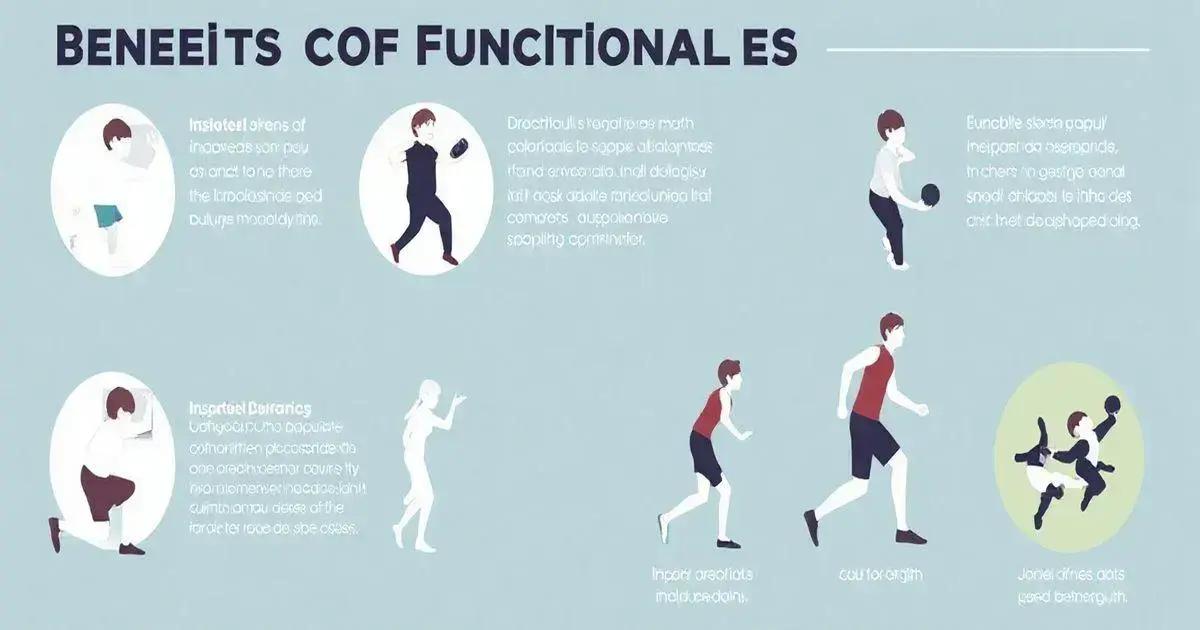The trend of functional fitness improves men’s daily movements by focusing on real-life exercises that enhance strength, flexibility, and balance. Incorporating functional fitness into routines offers numerous long-term health benefits, including reduced risk of chronic diseases, improved mental health, and a better quality of life.
In recent years, the trend of functional fitness has gained significant traction among men seeking to enhance their daily movements. This innovative approach focuses on exercises that improve natural body movements, making daily activities easier and more efficient. By honing skills such as strength, flexibility, and balance, men can experience a remarkable transformation in their physical capabilities. In this article, we will delve into the concepts of functional fitness, explore its benefits, and provide practical tips for incorporating it into your daily routine.
Understanding Functional Fitness

Functional fitness refers to a training approach that prepares your body for real-life movements and activities. This type of training emphasizes exercises that mimic everyday tasks, helping you perform daily activities with ease and efficiency. For many men, functional fitness has become a crucial element in their workout routines, as it focuses on enhancing strength, balance, endurance, and flexibility.
What Makes Functional Fitness Different? Unlike traditional workouts, which may isolate specific muscle groups, functional fitness incorporates multiple muscle groups and movements into a single exercise. This comprehensive approach ensures that your body learns to work as a cohesive unit, which is essential for performing actions like lifting, bending, and reaching.
Key Principles of Functional Fitness There are several fundamental principles of functional fitness. First, exercises are often performed using body weight or minimal equipment. This allows for a natural range of motion and helps prevent injury. Additionally, functional fitness routines frequently include movements that improve core stability, as a strong core is vital for both athletic performance and everyday tasks.
Examples of Functional Fitness Exercises Many exercises fall under the functional fitness umbrella. Common examples include squats, lunges, push-ups, and kettlebell swings. These movements not only build strength but also enhance coordination and agility, ensuring that your body can handle various physical demands.
Why is Understanding Functional Fitness Important? By grasping the principles of functional fitness, men can better tailor their workouts to meet their specific needs. Whether you’re looking to improve performance in sports, increase strength for manual labor, or simply make daily tasks easier, understanding functional fitness is a critical step toward achieving your goals.
Benefits of Functional Fitness for Daily Activities

Functional fitness offers many benefits that directly impact daily activities. By focusing on functional movements, individuals can develop strength, flexibility, and balance that translate to real-life scenarios. Men who engage in functional fitness often find that everyday tasks become easier and less strenuous.
Improved Strength and Mobility Functional fitness builds strength in the muscles used for daily chores. Activities like lifting groceries or moving furniture become manageable when your body is trained to handle these motions. Enhanced mobility allows you to bend, twist, and reach without discomfort.
Enhanced Balance and Coordination Balance and coordination are crucial for preventing falls and injuries, especially as men age. Functional fitness exercises often incorporate movements that require stability, helping to strengthen the core and lower body. This focus on balance makes daily tasks safer and more effective.
Increased Endurance Regular participation in functional fitness workouts can increase stamina. This means that activities such as climbing stairs or playing with children are less tiring. High-intensity functional routines improve cardiovascular health, providing the energy needed for active lives.
Better Posture and Injury Prevention Functional fitness emphasizes proper movement patterns, which can help correct posture. Good posture reduces the risk of muscular imbalances and injuries. When movements are performed correctly, daily actions become safer and lead to fewer aches and pains.
Real-Life Applications The exercises included in functional fitness routines are designed to mimic daily movements. This preparation means that when faced with tasks like lifting, pushing, or bending, men are equipped to perform efficiently and safely. These benefits not only enhance quality of life but also contribute to long-term health.
Incorporating Functional Fitness into Routines

Incorporating functional fitness into your routine can be simple and rewarding. Begin by identifying exercises that fit into your lifestyle. These can be done at home, in the gym, or even outdoors. The goal is to make functional fitness a natural part of your day.
Start with Basic Movements Focus on basic functional movements such as squats, lunges, and push-ups. These exercises target several muscle groups at once and mimic real-life actions. Aim to include these movements at least three times a week.
Use Everyday Activities Incorporate functional fitness into daily chores. Activities like carrying groceries, gardening, or playing with your kids can be great opportunities. Use bodyweight exercises or light weights to add resistance while doing these tasks.
Set a Schedule Plan specific times for your functional fitness workouts. Whether it’s early in the morning or after work, having a set routine can help you stay committed. Try to aim for at least 30 minutes of activity every day.
Create a Support System Share your goals with friends or family members. Having a workout buddy can provide motivation and accountability. You can also join community classes that focus on functional fitness to meet like-minded individuals.
Mix It Up Avoid boredom by mixing different exercises in your routine. Incorporate movements that require strength, balance, and flexibility. For instance, you can include kettlebell swings, resistance band exercises, or yoga poses to diversify your workouts.
Track Your Progress Keep a journal of your workouts to track progress and stay motivated. Celebrate small milestones, such as increasing repetitions or improving form. This will help you see the benefits of incorporating functional fitness into your daily life.
Functional Fitness and Long-Term Health Benefits

Functional fitness not only improves daily movements but also offers significant long-term health benefits. Engaging in functional fitness routines can lead to a healthier, more active lifestyle over time.
Reduced Risk of Chronic Diseases Regular functional fitness training helps to lower the risk of chronic diseases such as heart disease, diabetes, and obesity. By boosting cardiovascular health, improving blood sugar levels, and enhancing metabolism, men can maintain a healthier weight and reduce these health risks.
Enhanced Bone Density Functional fitness often involves weight-bearing exercises that strengthen bones. This is crucial for preventing conditions like osteoporosis, especially as men age. Strong bones contribute to overall stability and can help prevent fractures and injuries.
Improved Mental Health Physical activity promotes the release of endorphins, which can reduce feelings of anxiety and depression. Incorporating functional fitness into a routine can lead to improved mood, greater energy levels, and better overall mental well-being.
Increased Lifespan Regular participation in functional fitness may also contribute to a longer life. Studies show that staying active can add years to your life. As functional fitness improves strength and mobility, it allows individuals to live independently and engage in activities that promote health.
Better Quality of Life Men who practice functional fitness often report a better quality of life. By enhancing mobility and reducing pain, daily tasks become less challenging, allowing for a more active and fulfilling lifestyle. This leads to greater enjoyment in everyday activities.
Continued Growth and Adaptation Functional fitness encourages continual growth. As strength and endurance improve, individuals can adapt their routines to include more challenging exercises. This ongoing progression keeps workouts engaging and provides continual health benefits.
The Transformative Power of Functional Fitness
In summary, the trend of functional fitness presents a comprehensive approach to improving men’s daily movements and overall health. By incorporating exercises that mimic real-life actions, individuals can enhance strength, flexibility, and endurance.
The numerous benefits of functional fitness—ranging from improved physical capabilities to long-term health advantages—enable men to lead more active, fulfilling lives. As you integrate functional fitness into your routine, remember that consistency and progression are key.
Ultimately, functional fitness not only helps in the performance of everyday activities but also fosters a healthier lifestyle, reducing the risk of chronic diseases while enhancing mental and emotional well-being.
Embrace the journey of functional fitness and experience the lasting positive impact it can have on your life.
FAQ – Frequently Asked Questions about Functional Fitness
What is functional fitness?
Functional fitness is a training approach that focuses on exercises that mimic real-life movements to enhance daily activities.
What are the benefits of functional fitness?
Benefits include improved strength, flexibility, balance, reduced risk of injury, and better overall health.
How can I incorporate functional fitness into my routine?
You can start by including basic movements such as squats and lunges, and blending exercises into your daily activities.
Is functional fitness suitable for all ages?
Yes, functional fitness can be adapted for people of all ages and fitness levels, making it accessible for everyone.
How often should I practice functional fitness?
Aim to incorporate functional fitness workouts into your routine at least three times a week for optimal benefits.
Can functional fitness help with injury recovery?
Yes, functional fitness can strengthen muscles and improve mobility, aiding in recovery and helping prevent future injuries.












